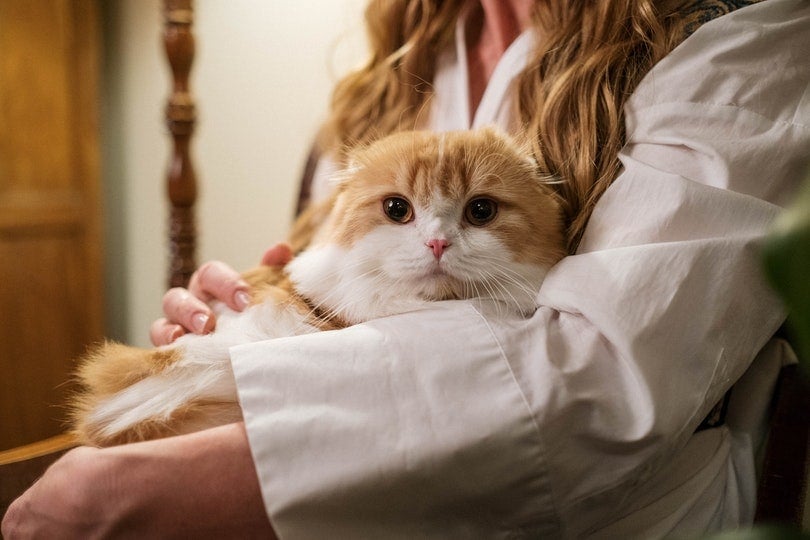
Last Updated on: October 4, 2023 by Crystal Uys
Cats are incredibly popular companion animals adored for their creative antics, naughty behavior, and unpredictable quirks, not to mention the love they give their human companions. While it’s clear that many people enjoy being around and living with cats, there’s far more to the story! It turns out that cats can be good for your health — assuming you’re not allergic!
Research has demonstrated the health benefits of pet ownership, including reduced stress, lowered anxiety, and improved heart health. Keep reading to learn more about the health benefits of living with a cat.
The Health Benefits of Having a Cat:
Mental Health Benefits
Your psychological health benefits from having a feline companion at home, and it appears that having a cat may positively influence people’s moods — it may even help ease some symptoms of depression.1

Physical Health Benefits
Living with a cat may provide some protection against developing cardiovascular disease and even lower the risk of adverse events such as strokes. Cat owners tend to have lower blood pressure and heart rates than individuals without pets.2
Felines can also help their owners stay calm during stressful situations. In one study, people who adopted cats experienced fewer aches and pains for several months after bringing their new companions home.3 There’s some evidence that living with cats can help strengthen babies’ immune systems.4 Cats also appear to be pretty good at calming some autistic children.5
Community Building Benefits
Cats, even those that technically aren’t allowed outside unsupervised, often become well-known in their neighborhoods. Feline activities such as food theft and unauthorized visits to neighboring homes happen despite the most stringent precautions.
Cats make social contact easier, which provides space for relationships to develop organically. These relationships can strengthen the neighborhood community, often leading to environments where people feel more comfortable borrowing tools, watering plants for neighbors on vacation, and asking for information and recommendations for anything from roofers to restaurants.

Are There Downsides to Cat Ownership?
While living with cats can benefit their owners, being responsible for the care of a living creature comes with responsibilities, some of which can be stressful.
Cats Can Be Expensive
As a pet parent, your costs can add up when you purchase high-quality pet food, cat towers, toys, treats, and regular veterinary care. Just providing the basics for a healthy adult cat for a year can end up costing over $1,100. Remember that an indoor cat’s average lifespan is between 13 and 17 years, and cats regularly live into their 20s.
Accidents happen even with the best possible cat-proofing in the world; cats eat things they shouldn’t, fall off balconies, and get into fights, which can result in unexpected and often extremely high medical bills. Insurance usually doesn’t cover pre-existing conditions, which can leave owners on the hook for what can be substantial medical bills.
Some owners have to replace expensive items like sofas, which may or may not create a financial strain. When you own a cat, going on vacation can become more expensive since you’ll have to cover boarding fees or pay a pet sitter.
Cats Can Make Doing Things Like Moving Difficult
Having a pet can also make relocating difficult. Some landlords aren’t happy to have feline tenants, which can make it hard for renters to find appropriate places to live. While it’s possible to pick up and move to another country for that dream job with a cat, doing so often is a long process that can quickly get complicated.

Cats Can Be Messy
While felines make remarkable pets, cleaning up cat vomit is usually a less-than-pleasant experience. Also, the cat’s litter box requires regular scooping, dumping, and cleaning. Maintaining a clean environment for a cat is crucial, and if the litter box is kept dirty, most cats will go somewhere else.
Grooming a cat is typically less labor-intensive than grooming a dog, but some breeds, especially longhaired cats, require daily brushing. Cats also need their nails clipped, teeth brushed, and ears cleaned; for some owners, the maintenance is too much for them.
Cats Need Daily Attention
Cats are interested in interacting with their human companions. They require regular attention and lots of playtime to be their best selves. A few short daily play sessions are usually enough to get their mental and physical activity needs met, but that’s only part of the equation.
Cats generally thrive when given lots of attention; many enjoy having “conversations” with their favorite people and love to join in whatever their owner is doing. Because cats are such creatures of routine, they often require extra support when their favorite people get new jobs or move to new places.
Conclusion
Cats are exceptional pets, and they’re even good for your health. Spending time with cats may lower blood pressure, help minimize the risk of strokes, and reduce stress. While cat companionship comes with many benefits, it (just like everything in this world) has downsides, many of which can be pretty stressful for some people.
Keeping cats fed and healthy can be expensive, and going on vacation or moving to a new city is more complicated. However, the advantages outweigh the disadvantages, and if you can care for them properly, you’ll have a feline friend for years.
Featured Image Credit: cottonbro, Pexels
About the author
Cat mom to Ivy – a feisty little rescue kitten that is her one and only child. For now! Throughout her life, she has been introduced to the special love that can be found in the bond with a cat. Having owned multiple felines, she is more than certain that their love is unmatched, unconditional and unlike any other. With a passion to educate the public about everything, there is to know about felines, their behavior, and their unique personalities, Crystal is devoted to making sure that all cats and their owners know the importance of conscious living – and loving!
Credit : Source Post





